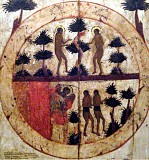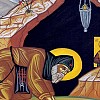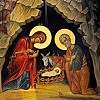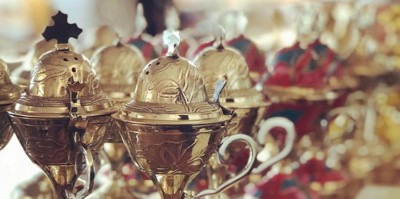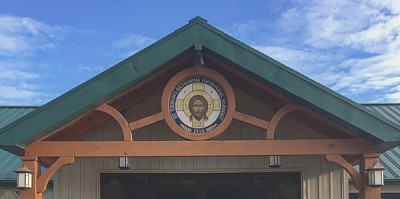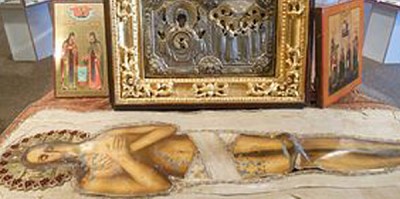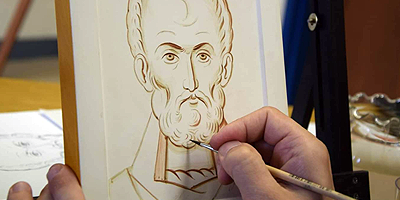Examing the third and fourth weeks of the Triodion
Part 2 of 2
[On the Third Sunday of the Triodion] The most Divine Fathers placed this parable after the first two (those of the Publican and Pharisee and of the Prodigal Son), lest anyone, learning about God’s love for mankind in those parables, should live carelessly, saying: God loves mankind, and when I cease from sinning, I shall be ready to accomplish everything.
They set this fearful day here, in order to instill fear, through death and the expectation of future torments, in those who are heedless, and to bring them back to virtue, not trusting in God’s loving-kindness alone, but taking into account that He is a just Judge, Who will render unto each man according to his deeds.
Christ’s coming is called the Second Coming, because whereas He first came to us in bodily form, quietly and without glory, He will now come from Heaven with wonders that transcend nature, with conspicuous radiance, and corporeally, so that He may be recognized by all as being He Who first came and delivered the human race, and Who is going to judge it, to see whether it has preserved what was given to it.
When His Coming will take place, no one knows; for the Lord kept this hidden even from the Apostles.
It should be known that Christ will not be looking at that time for fasting, bodily hardships, or miracles, good though these things are, but for things that are far superior, namely, almsgiving and compassion. To the righteous and the sinners He will speak of six virtues: “For I was hungry, and ye gave Me food; I was thirsty, and ye gave Me drink; I was a stranger, and ye took Me in; naked, and ye clothed Me; I was sick, and ye visited Me; I was in prison, and ye came unto Me; for inasmuch as ye have done it unto one of the least of these My brethren, ye have done it unto Me.”
Everyone can do these things according to his own ability.
On [Forgiveness Sunday, the Fourth Sunday of the Triodion] we commemorate the banishment of Adam, the First-formed man, from the Paradise of delight.
Our Holy Fathers appointed this commemoration before the Holy Fast, as if to show in actual fact how beneficial the medicine of fasting is to human nature, and also how great is the shame of gluttony and disobedience. Passing over all the individual sins committed in the world on account of him, as being without number, the Fathers set forth how much evil Adam, the first-formed man, suffered from not fasting even for a brief time, and how much evil he thereby brought upon our race, clearly pointing out also that the virtue of fasting was the first commandment that God gave to mankind.
Not keeping this commandment, but yielding to his belly, or rather, through Eve, to the deceitful serpent, Adam not only did not become God, but also incurred death and transmitted corruption to the whole human race.
Because of the self-indulgence of the first Adam, the Lord fasted for forty days and was obedient. For this reason, the present Holy Fast was designed by the Holy Apostles, in order that we might enjoy incorruption, through fasting, by keeping the commandment which he did not keep, thereby suffering the loss of incorruption. Furthermore, as we said previously, the aim of the Saints is to encompass in brief the works wrought by God from the beginning to the end. Since Adam’s transgression and his expulsion from the Paradise of delight were the cause of all our woes, for this reason they now set this transgression before us, so that, remembering it, we might avoid it and not in any way emulate his incontinence.
On this day, after Vespers – after hearing the announcement of Lent in the Great Prokeimenon: "Turn not away Thy face from Thy child for I am afflicted! Hear me speedily! Draw near unto my soul and deliver it!", after making our entrance into Lenten worship, with its special memories, with the prayer of St. Ephraim the Syrian, with its prostrations – we ask forgiveness from each other, we perform the rite of forgiveness and reconciliation.
- Excerpted from an article on the Orthodox Outlet for Dogmatic Enquiries website
|
| |||||||||||||
175 St. Tikhon's Road
Waymart, PA 18472
Sun
9MarTriumph of Orthodoxy
9:10 Hours and Divine Liturgy
4:30 Vespers & Small ComplineMon
10Mar6:00 Midnight Office, Matins, Hours
4:30 9th Hour, Typica, Vespers, Great ComplineTue
11Mar6:00 Midnight Office, Matins, Hours
4:30 9th Hour, Typica, Vespers, Great Compline

